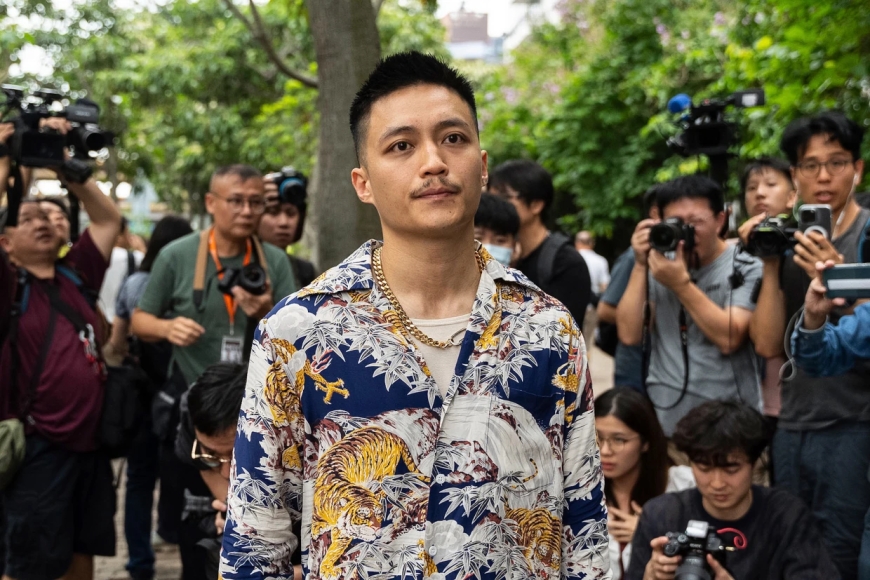Hong Kong Court Finds 14 Pro-Democracy Activists Guilty of Subversion in Landmark Case
In a significant ruling under Hong Kong's national security law, a court on Thursday convicted 14 of 16 pro-democracy activists of conspiracy to subvert the state. This marks the largest case to date under the sweeping legislation imposed by Beijing.

In a significant ruling under Hong Kong's national security law, a court on Thursday convicted 14 of 16 pro-democracy activists of conspiracy to subvert the state. This marks the largest case to date under the sweeping legislation imposed by Beijing.
The three judges, specially appointed by the government, acquitted former district councilors Lawrence Lau and Lee Yue-shun, making them the first defendants under the national security law to be found not guilty after trial.
The defendants are part of a group of 47 politicians, academics, and pro-democracy figures charged with conspiracy to commit subversion related to their participation in an unofficial primary election. Those convicted, alongside 31 others who previously pleaded guilty, face potential sentences ranging from three years to life in prison.
Critics argue that this trial epitomizes the erosion of freedoms in Hong Kong, highlighting the crackdown on dissent following the mass protests of 2019. Most of the 47 have been detained without bail since early 2021.
“This trial is not just a trial for these 47 individuals,” said Eric Yan-ho Lai, a research fellow at the Georgetown Center for Asian Law. “It’s a trial for the pro-democracy movement in Hong Kong.”
Public interest in the case was high, with people lining up hours in advance to attend the court proceedings. Diplomats and journalists also filled the courtroom amid tight security.
“This is a very significant moment for the history of Hong Kong,” a 26-year-old man named Wong told NBC News outside the courthouse. “This trial is one of the landmark trials that will dictate the future of Hong Kong.”
A 75-year-old woman named Kwok, who arrived at 6 a.m. to secure a seat, stated, “I'm here to support our fellow travelers. As ordinary citizens, we pursue democracy and freedom. That’s all. It’s as simple as that.”
Outside the courthouse, veteran activist Alexandra Wong, also known as “Grandma Wong,” waved a large British flag, symbolizing Hong Kong's colonial past, as police officers looked on.
One of the acquitted, Lee Yue-shun, expressed gratitude for public support but declined to comment on the ruling, citing the possibility of a government appeal. Lawrence Lau similarly deflected attention from his acquittal, urging continued support for the other defendants.
Among the convicted are former lawmakers Leung Kwok-hung and Raymond Chan, and journalist-turned-activist Gwyneth Ho. Their trial, which began in February 2023, concluded in December, with the ruling announced on Thursday.
Hong Kong's national security cases have thus far maintained a 100% conviction rate, with trials often diverging from the city's traditional legal norms, including a presumption against bail. Since the national security law's enactment in 2020, nearly 300 people have been arrested under its provisions.
The charges stem from an informal primary election held in July 2020, in which over 600,000 voters selected pro-democracy candidates for a legislative election initially scheduled for September 2020. Many candidates had pledged to veto the government's budget proposals to pressure the resignation of then-leader Carrie Lam.
Authorities warned at the time that participating in the primary could violate the newly enacted national security law. Critics contend the law, which criminalizes secession, subversion, terrorism, and collusion with foreign forces, is used to stifle dissent in the city, once promised autonomy and Western-style freedoms for 50 years following its 1997 return to Chinese rule.
In January 2021, over 50 activists were arrested in connection with the primary election, and 47 were later charged. The legislative election, postponed due to the pandemic, took place in December 2021 under revised laws ensuring only "patriots" could run for office.
Prosecutors argued the defendants aimed to paralyze the government by pledging to veto budgets. They cited organizer Benny Tai's description of using legislative majority as a "constitutional weapon of mass destruction."
Defense lawyers maintained their clients' actions were constitutional and not criminal. However, the judges ruled that subversion could occur without physical violence or traditional criminal acts, stating the defendants' success would have significantly disrupted government functions.
The acquittals of Lau and Lee were based on insufficient evidence of intent to subvert state power.
Those who pleaded guilty, including four who testified for the prosecution, may seek sentence reductions. The 14 who were convicted on Thursday will also have the opportunity to request leniency at future hearings. Many, including Joshua Wong and Wu Chi-wai, have already faced multiple sentences related to other charges.
Despite their extended detention, separating them from families and leading to personal losses, such as the death of Wu Chi-wai's parents, the activists remain a potent symbol of Hong Kong's pro-democracy movement.













































